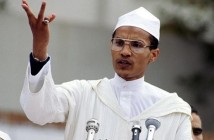March 3, 2011
* In a short article in ReligiousIntelligence.com one of the country’s Jewish leaders insists that his community has nothing to fear from the current unrest. The situation is stable… The King is listening, and has reform projects on his desk, ready to be implemented. As loyal citizens of the King, we Jews have every confidence in him.
* The Moroccan royal family has put a stake in one of the region’s leading banks up for sale, according to Reuters. The stake in Morocco’s largest bank, Attijariwafa is owned by a conglomerate owned by the King’s family. The move is apparently a response to popular concern about the Family’s domination of the country’s economy.
* Pubic Radio’s Gerry Hadden writes that everyone in Morocco seems to be a democrat, seeking to be a player in a new society. On that point, there seems to be unanimity of opinion. He wonders what comes next once reforms are in place. Only when this period of uncertainty is over and democratic reforms are well underway are we likely to see strong political differences reemerge.
March 5, 2011
* The U.S. is pursuing a strategy of supporting Arab leaders who are willing to reform, according to the Wall Street Journal (U.S. Wavers on ‘Regime Change’ March 5, 2011). On Sunday, February 27 Undersecretary for Political Affairs termed Morocco’s King Mohammed VI “a model of economic, social, and political reform.” According to the WSJ, The approach[es] signal[s] Washington’s willingness to vary its strategy depending on its interests and the willingness of autocratic leaders to respond to popular protests.
* Standard & Poor’s does not expect any significant changes to take place in its rating of Morocco, according to an interview in Commodities Now:
We perceive social and economic tensions to be lower in Morocco than elsewhere in the region. King Mohammed VI initiated a gradual political and economic liberalization more than a decade ago when he succeeded his father. Therefore, while we believe the protests could lead to some political and economic policy changes, we currently don’t expect this to lead to significant risks to political stability and trigger a change in the rating.
April 6, 2011
* The Christian Science Monitor reports that Morocco is undergoing what the country’s Prime Minister calls a “peaceful revolution.” After the wave of protests swept the country King Mohammed VI took the rare step of making a television address to announce that he was willing to take the major step of relinquishing his power to appoint the Prime Minister and to dissolve Parliament. The King has established a Commission to propose changes to the national constitution and has invited leaders of the protest movement to join the process.






